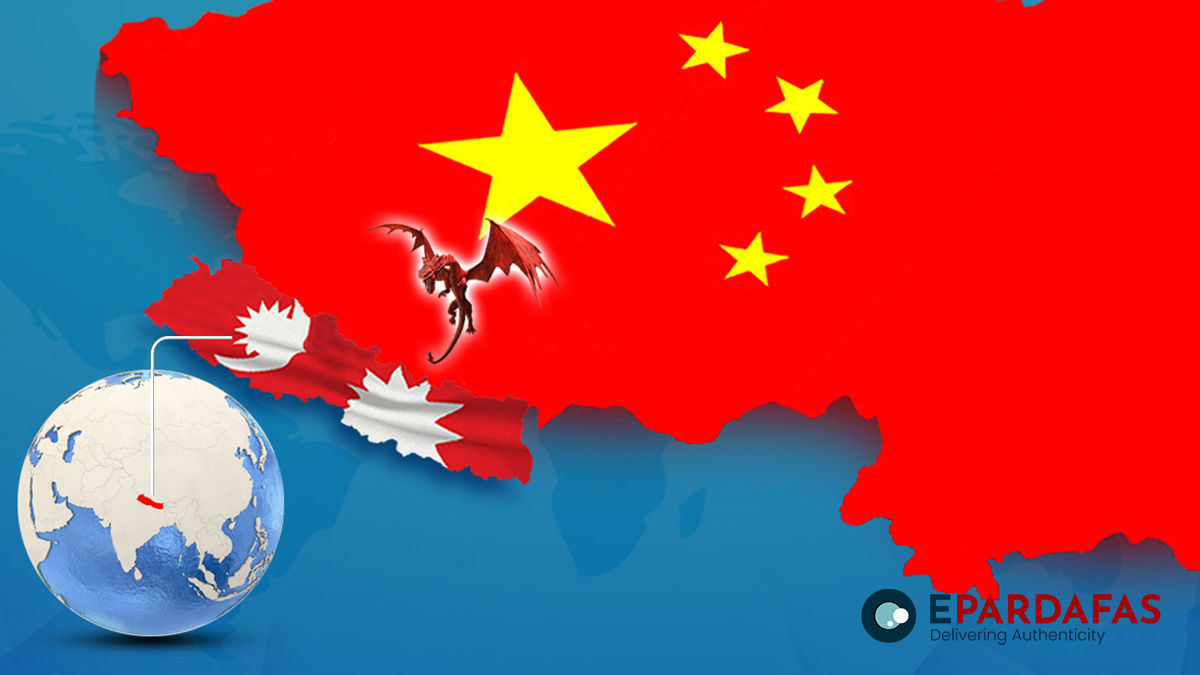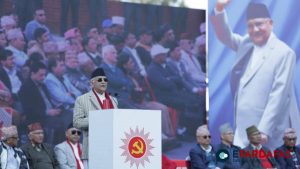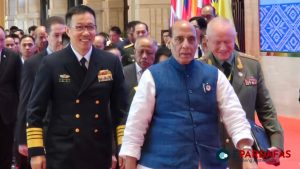
Government Rushes to Advance BRI to Satisfy China, High Rate Conditions May Trigger Crisis
Prime Minister Pushpa Kamal Dahal ‘Prachanda’, who ended the alliance with the Nepali Congress and formed a coalition with the UML, has initiated steps to support China’s Belt and Road Initiative (BRI) project.
Former Finance Minister from the Nepali Congress, Dr. Prakash Sharan Mahat, took the position of considering the BRI project only under conditions of subsidy or a favorable interest rate, which drew dissatisfaction from the Chinese side.
With the appointment of Maoist leader Barshaman Pun as the new Finance Minister, Prime Minister Dahal finds it more feasible to promote the BRI.
Chinese Ambassador to Nepal, Chen Song, has been engaging with leaders and exerting pressure for the advancement of the BRI.
Former Finance Minister Mahat emphasized that Nepal is now prioritizing grant support over loans. In discussions with Chinese officials, he insisted on grant support within the BRI framework. His stance on rejecting projects based solely on high-interest loans has irked the Chinese officials further.
The BRI, particularly with its high interest rates, typically involves exclusive utilization of Chinese technology and labor. “I have removed all conditions and proposed that the interest rates should be similar to those offered by the World Bank and Asian Development Bank (ADB),” stated former finance minister Mahat. He highlighted the need for further discussions and clarity on the issues related to the exclusive use of Chinese workers and technology.
Economists have repeatedly warned the government against implementing the BRI with expensive loans, citing concerns that it could lead to a situation similar to that of Sri Lanka. Mahat noted that there are existing issues with BRI projects, with even those previously funded by grants showing little progress.
Chinese Ambassador Song held meetings with Finance Minister Pun and Foreign Minister Narayankaji Shrestha, seeking a roadmap for BRI implementation. The Nepalese side has been criticized for the slow pace of implementing Chinese BRI projects and is now under pressure to expedite the process.
Sources within the Ministry of Finance have revealed that files are being requested to identify the current bottlenecks in BRI projects under the new coalition government.
If Finance Minister Pun agrees to the current conditions set by China, Nepal’s debt to China could further increase. Pun has called for a list of projects to be prepared for potential agreement by the end of June, responding to pressure from the Chinese side to negotiate by that time. UML Chairman KP Sharma Oli and Prime Minister Dahal also appear to be in agreement with this timeline.
During his visit to China some time ago, Prime Minister Dahal also expressed interest in the Belt and Road Initiative (BRI). Prior to Prime Minister Dahal’s trip to Dubai to attend the Climate Change Conference (COP-28), Chinese Ambassador Song visited Baluwatar and raised the issue of BRI project implementation.
Despite pressure from the Chinese side, the Ministry of Finance, led by Minister Mahat, refused, citing concerns about heavy debt associated with the BRI. The conditions under which Barshaman Pun will accept or reject the project are being closely monitored.
While there is no final agreement between Nepal and China on which projects will be included under the BRI, China announced in a public program that Pokhara International Airport is also part of the initiative.
During Prime Minister Dahal’s visit to China, discussions were held to advance the BRI project, with Chinese President Xi Jinping expressing concern to Prime Minister Dahal about its progress in Nepal.
Nepal and China signed a memorandum of understanding on the BRI, a flagship initiative of Chinese President Xi Jinping, on May 12, 2017, when Dahal was Prime Minister of Nepal. This is why China is now increasing pressure on Dahal.
The BRI has faced criticism for burdening poor countries with debt.
BRI is becoming a debt trap for poor countries
A study has shown that under the Belt and Road Initiative (BRI) launched by China, dozens of low-income countries like Nepal are falling into the trap of debt.
A study report published by Ed Data, which researches studies on foreign debt and aid, concluded that low- and middle-income countries are falling into the trap of China’s secret loans.
Research has provided different rationales as to how countries are falling into the trap of hidden debt. Studies have shown that high interest rates and short-duration projects are becoming problematic in the implementation of investment projects, and the lack of transparency is adding long-term liability to poor countries.
Research has shown that Chinese debt is not only opaque but also extremely expensive compared to loans from other countries and institutions.
The OECD and other development partners lend to low- and middle-income countries at an interest rate of 1.1 percent, while China lends at an interest rate of up to 4.2 percent. The repayment period of Chinese loans is also seen to be very short compared to others, with the average duration being only 10 years, whereas other countries receive loans for up to 28 years.
China extends loans abroad through its state-owned banks and companies. These loans are typically provided under the Belt and Road Initiative (BRI) to government-owned banks, special joint ventures, and private institutions. However, such loans often do not appear in the government’s official financial records. Research indicates that a significant portion of these projects encounter difficulties, with high-interest debt exacerbating economic challenges for recipient countries.
According to recent studies, approximately 35 percent of BRI projects encounter implementation issues. These problems include corruption, labor exploitation, environmental degradation, and public opposition. In contrast, only 21 percent of Chinese government projects outside the BRI face similar challenges.
Furthermore, research highlights the heightened risk for poorer countries to fall into a debt trap due to opaque loan agreements, coupled with issues of corruption and bureaucratic delays.













Comments